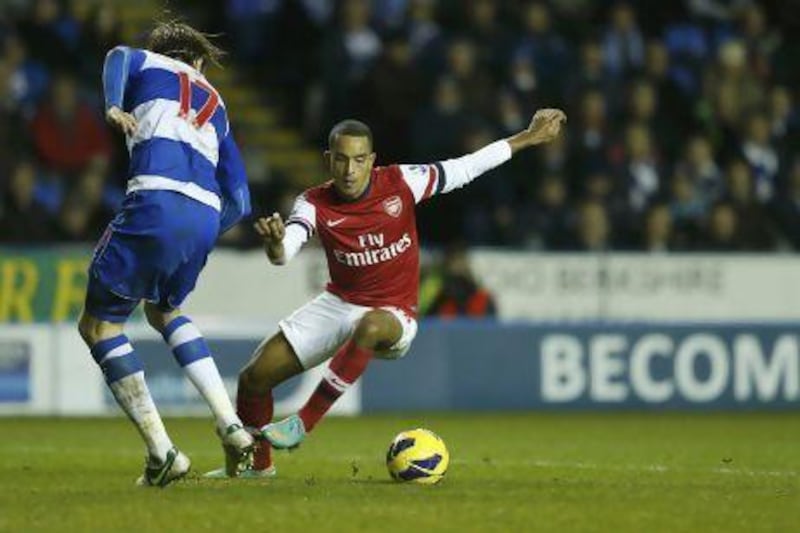The next 10 days could shape Arsenal's season. Maybe even their future for the next few years.
Perhaps that is an exaggeration, especially because the December 26 fixture against West Ham United has been postponed, yet their two remaining matches of 2012, against Wigan Athletic and Newcastle United could determine the direction of their attack. So, as a result, could the month that follows it.
Theo Walcott was belatedly granted the chance to play in his preferred position as a striker in Monday's 5-2 win over Reading. He scored and starred, but the test is whether Arsene Wenger is willing to keep the winger in the middle of his forward line.
There were specific reasons to start with Walcott at the Madejski Stadium - he had scored a hat-trick there in the Capital One Cup in October - whereas there are no such factors where Wigan are concerned. Should Walcott lead the line, it will be a sign that speed has been preferred to the size of Olivier Giroud.
If Walcott is chosen, it will give him an added reason to stay.
In 10 days' time, on January 1, Wenger, linked with the Schalke striker Klaas-Jan Huntelaar and Newcastle's top scorer Demba Ba, can buy if he chooses.
In 10 days' time, Walcott enters the final six months of his contract. His representatives can start negotiating a pre-contract agreement with foreign clubs.
While Wenger has always pronounced his confidence that the 23-year-old Englishman will stay, Arsenal are scarred by their past. He has been certain and players seemed loyal in the past. In the last 18 months alone, however, Arsenal have lost Cesc Fabregas, Samir Nasri and Robin van Persie.
"My gut feeling is that he belongs to this club and that I hope he will sign for us," said Wenger, who has ruled out cashing in on Walcott with a January sale. "I am happy to pay Theo the money he deserves."
Yet while five young Britons signed long-term contracts this week, Walcott was not one of them. The quintet of Jack Wilshere, Alex Oxlade-Chamberlain, Carl Jenkinson, Aaron Ramsey and Kieran Gibbs are no longer at the negotiating table. Walcott is.
The situation is complicated by the apparent interest of Liverpool and Manchester United as well as the uncertainties about Walcott's rightful role. Approaching the seventh anniversary of his arrival at Arsenal, he still divides opinion.
A striker in his own eyes, a winger to others, Walcott is branded inconsistent.
Actually, the figures suggest he is among the more reliable scorers from the flanks: since the summer of 2010, he has 35 goals in all competitions, reaching double figures in every season.
Despite starting only nine games this season, he is Arsenal's top scorer.
Compared to the infuriatingly erratic Gervinho, he is a paragon of reliability. What he has not been, however, is dependably clinical.
There is a precedent of Wenger turning wasteful wingers into prolific poachers. Thierry Henry and Van Persie were both converted, keeping the flair they displayed on the flanks but developing a predatory instinct.
If they are the role models, Henry, a similarly quick player whose No 14 shirt Walcott inherited, is the trailblazer for him.
But Wigan's defence, while injury-hit and scarcely watertight, ought to present a stiffer test than an embarrassingly open Reading team.
Walcott is unlikely to allowed seven shots on goal every game, as he was on Monday.
Away from home, he must hold the ball, rather than simply breaking at speed. At home, opponents will defend deep to try to negate his pace. In short, he must prove he is a multidimensional footballer.
Wenger's forwards have tended to be unconventional but the finest, Henry and Van Persie in particular, had several strings to their bows.
Walcott's reinvention at Reading also allowed the manager to select Oxlade-Chamberlain on the right wing.
"We hope we will be capable of building a team around the young English players and achieve something together," Wenger said.
One way would be to put an Englishman at the forefront of his forward line.
Yet Walcott, one of the club's longest-serving players, polite and friendly but unable to agree a contract, a regular scorer who many think should not be a striker, represents Arsenal's pacey paradox.
He is the quick player whose future has been a slow, drawn-out saga.
Follow us
[ @SprtNationalUAE ]






